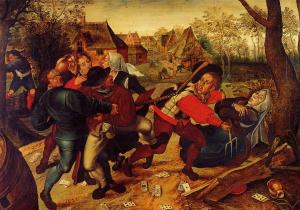How to live? Is enlightenment found in hard labour and austerity, or through acquiring knowledge? What is it to live a meaningful existence? These perpetual concerns are Chekhov’s theme in My Life.
Rejecting a professional career, Misail Poloznev, a young nobleman, turns to a life of manual labour and poverty. Censured by his father and derided by small-minded townsfolk, only ‘plump, fair beauty,’ Masha Dolzhikov encourages Misail’s alternative lifestyle. Masha and Misail fall in love, marry, and move to her family’s derelict country home. Though Misail finds a degree of contentment, Masha grows to despise the unruly peasantry and abandons the life that was for her a temporary adventure. Embittered, Misail remains committed to his austere life as a manual labourer.
Chekhov’s response to the questions that underpin this story seem to be that disillusion is at the end of either path. What matters is the choice. Is it possible that Chekhov had access to Kierkegaard?
One must work for a living in order to live – that’s just the way life is – it’s the shabby side of existence. We sleep seven hours out of twenty-four; its wasted time, but it has to be that way. We work five hours our of the twenty-four; it is wasted time, but it has to be that way. By working five hours, a person has his livelihood, and when he has that he begins to live. Now, a person’s work should preferably be as boring and meaningless as possible, just so he has his livelihood from it.
Longer than many of his stories, in My Life Chekhov also demonstrates his tendency to write strong women characters. Both Masha and Misail’s sister, Kleopatra, are every bit as developed as the main protagonist.
This story was new to me, though I have read very many of Chekhov’s shorter stories, and immediately establishes itself as one of my favourites.
[Read as part of Frances’s and Melville House’s The Art of the Novella Reading Challenge.]


“Chekhov, always Checkhov,” to quote D. Mitchell. Many cheers, Kevin
Over the horizon, I see a Chekhov binge approaching.
Very good to know! I’ve read extremely little of Chekhov, but always hear his short work praised of course. Am smiling because in Jacob’s Room there’s a key exchange in which one character gives another a book of (T)Chekhov – if you wanted to link these novellas together you could read the Woolf next.
I could but my daughter would give me hell. For this challenge she is my randomiser. It is creating a strangely dissonant experience, as I normally like to allow serendipitous links to lead me from book to book.
it sounds like somehting i should read… i’m about to read chekov’s island any time soon… do you know sokurov’s movie “stone”? it’s wonderful…
No, I don’t know Sokurov’s Stone, but I gather it is about Chekhov? Do you know what Sokurov collection it appears on?
yes it’s about chekhov…. i don’t know on which collection it is…. but here is a link to it,
http://www.sokurov.spb.ru/island_en/feature_films/kamen'/mnp_kam.html
Thank you.
“The Shooting Party” is Chekov’s best. You must read if you haven’t. There’s a film called “My Tender and Affectionate Beast” based on the story and it’s mesmerising.
I didn’t know of the film adaptation, but love the story. I may spend the winter reading Chekhov, and Janet Malcolm on Chekhov.
The film is stunning. I’m not sure, however, if they have it subtitled in English. It’s a must-see, the photography is incredible.
I’ve found reference online: http://hila-lumiere.blogspot.com/2008/10/my-tender-and-affectionate-beast.html, and gather it is obtainable, though rare, with English subtitles. Looks promising, must see if I can track it down.
that disillusion is at the end of either path
This is an excellent distillation of the bleakness I alluded to at the end of my post!
Pingback: Rasselas, Prince of Abyssinia by Samuel Johnson | Time's Flow Stemmed